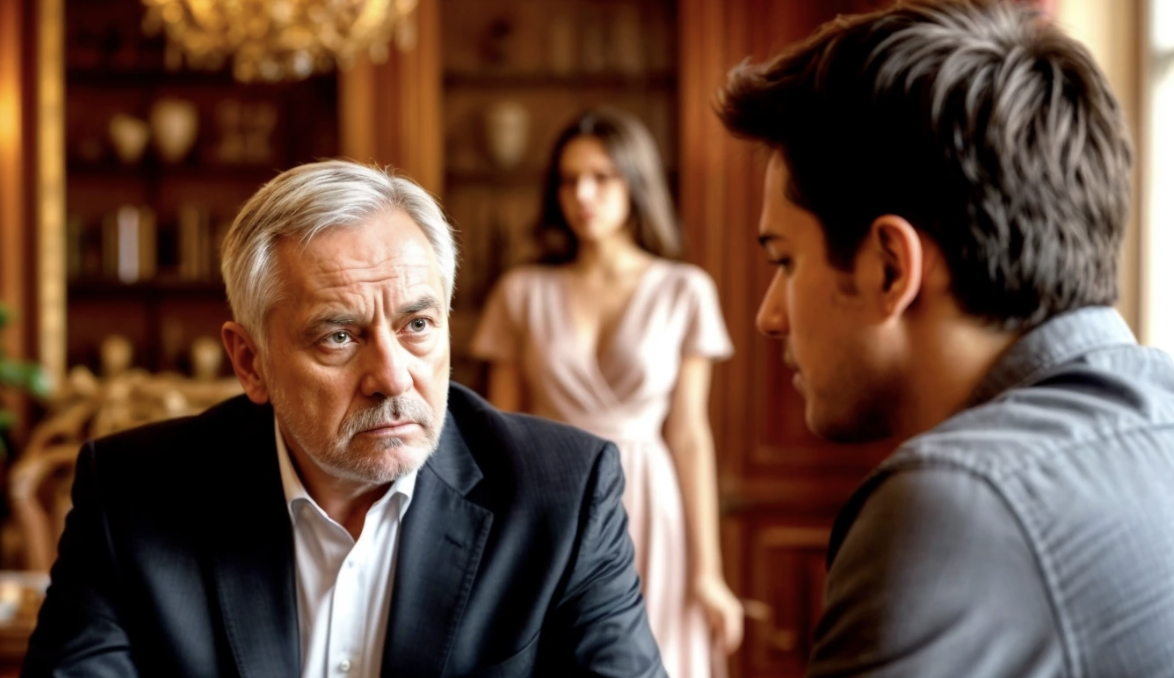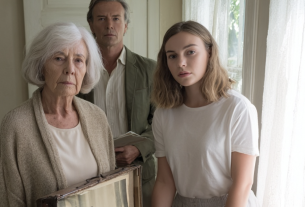“Listen, son-in-law, no beating around the bush,” said my father-in-law, placing a thick stack of bills on the table. He looked me straight in the eye, as if appraising not a person, but a product. “Here is one million rubles. Divorce Alena and disappear from our lives. Forever.”
I silently looked back and forth between the money and him, unable to believe what was happening. That morning, I was just a husband who loved his wife. And now I was sitting in front of my father-in-law, who apparently found it easier to buy me than to accept me.
“Vladimir Petrovich… I don’t understand…”
“No need to understand,” he interrupted sharply. “You’re not good enough for my daughter. She deserves better. Take the money, disappear — and everything will be fine. The easy way.”
The story began three years ago when I first saw Alena. We met in a small café near the university where she studied economics. I had just graduated from a technical school and worked as a locksmith at a factory. At first glance, we had nothing in common. But fate had other plans.
The October rain lashed against the window as I rushed into the café to warm up before the night shift. All seats were taken except one — where a girl was sitting with a book on macroeconomics. She looked up, smiled, and nodded briefly:
“Sit down. There’s enough room.”
Alena turned out to be nothing like I had imagined — not cold, not a haughty student from a prestigious university. She was natural, open, sincere. We talked until dawn, and when I realized I was late for work, she wrote her number in my worn notebook.
“Call me when you’re free,” she said. “I enjoyed talking to you.”
I called her the next day. Then again, and again. We started dating, and every meeting felt like a little celebration. She told me about her lectures and future plans. I shared my world — machines, shifts, workdays.
I met Alena’s parents only after six months. She postponed the introduction for a long time, and now I understood why.
Vladimir Petrovich, director of a large construction company, and Marina Sergeevna, a cardiologist, greeted me politely but coldly. Especially the father.
“What do you do?” he asked, eyeing me like I was merchandise at a flea market.
“I work as a locksmith at a factory,” I answered honestly.
“I see…” he said through clenched teeth, and there was so much contempt in that “I see” that I felt worthless.
Dinner was tense. They clearly expected someone else for their daughter — a businessman’s son, a successful manager, a brilliant student. Instead, they got me — a guy in a worn jacket with hands scratched from work.
After that evening, Alena was upset.
“Don’t pay attention,” she said, hugging me. “They’ll get used to it. They just want what’s best for me.”
“And I’m not the best?”
“For me — yes,” she replied quietly. “You’re the best for me.”
But her parents didn’t get used to it. Every visit became a test. My father-in-law hinted at my “lack of prospects,” and her mother sighed and whispered:
“Alena could have married anyone…”
Nevertheless, Alena and I were happy. She graduated university, got a job as an economist at a bank, and I went to evening classes at the engineering faculty. Worked days, studied nights, dreaming of being accepted as an equal.
Two years later, I proposed. No luxury, no restaurant. We just sat on a bench in the very park where we met, and I gave her a ring I’d been saving for six months.
“Alena, marry me.”
She cried and said “yes.” It was the best moment of my life.
When we told our parents about the engagement, the reaction was predictable. Her mother almost fainted, and father-in-law turned red:
“Are you crazy?! To marry this loser?!”
“Dad, I love him.”
“Love is a luxury only the rich can afford! What will you eat on that love?”
“I’ll finish university soon and find a good job,” I said.
“Who needs you with that correspondence degree?!” he snorted.
The wedding was modest. The parents came, but it was clear they didn’t belong there. The father-in-law frowned all evening, the mother-in-law whispered to her friends about an “unequal marriage.”
We moved to a one-room apartment on the city outskirts. Money was tight, but we were happy. In the evenings, I did homework for university, and Alena helped me with economics.
“I never thought I’d be so happy in a one-room apartment with a student husband,” she said.
“And now?”
“Now I’m sure.”
But happiness didn’t last long.
My father-in-law started acting. First, he “accidentally” set her up with other men — colleagues, friends, partners’ sons. Alena refused, but he didn’t give up.
“Look at yourself!” he said. “You’re an economist at a bank, but live like a student. Your friends already have houses, and you ride the bus!”
Then he pressured me. Came when Alena was at work, and “had heart-to-heart talks”:
“Sergey, you’re a smart guy. Don’t you realize you’re ruining the girl’s life? She could be with someone better.”
“But she says she’s happy.”
“She’s young, foolish. She’ll realize later she made a mistake.”
These talks lasted months. His words slowly undermined my confidence. Maybe he was right? Maybe I really wasn’t good enough for her?
My insecurity started affecting our relationship. We argued more often. Alena felt something was wrong.
“What’s wrong with you?” she asked. “You’ve become distant.”
“Just tired,” I answered.
But I couldn’t tell her about the talks with her father. How to explain he regularly humiliated me? That sometimes I started believing it myself?
A year and a half after the wedding, the climax happened. I defended my diploma and got a job offer as an engineer — with double my old salary. I rushed home to share the good news with my wife.
But at home, a surprise awaited me.
My father-in-law was sitting on the sofa. Next to him — a bag of money.
“Sit down, son-in-law. Let’s talk man to man.”
He put a million rubles on the table and repeated his offer:
“Take the money. Disappear. I will get what I want. Either the easy way or the hard way.”
I looked at the money, thinking about how many times I dreamed of such a sum. Furniture, vacation, a child… And now it was all in front of me. For one signature.
“What if I refuse?” I asked.
“Then I’ll make sure you lose everything. Job, reputation, future. I have connections.”
At that moment, Alena entered the room. She saw us, the money on the table, and immediately understood everything.
“Dad, what does this mean?” Alena asked quietly, glancing at us and the bag on the table.
“Nothing special, daughter,” the father-in-law replied as if talking about the weather. “Just offered your husband a good deal.”
“What deal?” Alena’s voice trembled.
The father-in-law was silent, and I realized it was time for the truth. I could lie, pretend nothing happened. Take the money and disappear — as he suggested. Or be honest.
“Your father offered me a million rubles to divorce you,” I said plainly.
Alena turned pale and sank into a chair.
“Dad, is it true?”
“Yes, it’s true,” the father-in-law didn’t even deny it. “And I see nothing wrong with it. I want you to be happy. Not to suffer in poverty.”
“And did you ask me what I want?”
“You’re young, you don’t understand…”
“Understand what? What love is? What happiness is?”
“Happiness is when you don’t have to count every penny! When you can afford everything! Not live starving with this…”
“With my husband,” Alena interrupted coldly.
A heavy silence fell. All eyes turned to me. The father-in-law — hopeful, Alena — filled with pain and fear.
“Vladimir Petrovich,” I finally spoke. “Your offer is generous. A million is serious money for a man of my standing.”
Alena closed her eyes. The father-in-law leaned slightly forward.
“But I refuse,” I continued. “And you know why? Because my wife is worth not a million, not ten million, but all the money in the world. And also because I don’t sell my love.”
“Fool!” shouted the father-in-law. “You’re missing the chance of a lifetime!”
“Maybe,” I agreed. “But I’m not missing the wife of my life.”
“Sergey…” Alena whispered, and her voice held so much love I knew I had chosen right.
“You’ll regret it!” the father-in-law spat as he gathered the money. “You both will regret it.”
After he left, we sat holding each other for a long time.
“Did you know about his offers before?” she asked.
“Yes. He came several times, urging me to leave.”
“Why didn’t you tell me?”
“I didn’t want to make you fight with your father. And I was afraid you’d think — he’s right.”
“Fool,” she smiled. “A big fool. Don’t you know what you mean to me?”
That evening, we made a decision — we were leaving. I got a job offer in St. Petersburg, Alena found a suitable position at a bank.
“Let’s start over,” she said. “Without advice and pressure.”
A month later, we left the city. The father-in-law didn’t see us off. Only the mother-in-law came to the airport, crying and hugging her daughter.
“Maybe you’re wrong?” she whispered. “Dad just wants the best.”
“Mom, I’m an adult. I know what I want,” Alena replied.
Five years have passed. We live in St. Petersburg, have two children — a son and a daughter. I’m chief engineer at a large construction company, Alena is deputy head of the credit department at the bank. We bought a three-room apartment, a car, and travel abroad for vacations.
Recently, I calculated our income. Over these years, we earned more than the million the father-in-law offered. But it’s not about the money.
Alena calls her mother once a week, doesn’t communicate with her father. He tried to reconcile but every time it ended the same:
“You’d be better off living at home.”
One evening, Alena said:
“Sometimes I think about that day. And every time I realize — if you had agreed then, I would never have forgiven myself.”
“And if I had agreed, we wouldn’t have children,” I replied, looking at the playing little ones.
“And we wouldn’t have this life,” she added.
Sometimes I think the father-in-law himself helped us become stronger. His offer was a test we passed. He wanted to destroy us — but instead, he strengthened our bond.
The first years in St. Petersburg were tough. We lived in a communal apartment, saved on everything. But we were together — and that made us rich.
Then something no one expected happened.
The father-in-law came on a business trip and asked for a meeting. We met in the same café where I once met Alena.
“Son-in-law,” he said, “I was wrong.”
I almost choked on my coffee.
“In what?”
“In many things. I thought money was everything. That without it, there’s no happiness. You proved otherwise. You built a family on love, and money came later.”
He took out an envelope.
“This is for you. Consider it an investment in the grandchildren’s education.”
I looked at him, at the envelope, and gently replied:
“Vladimir Petrovich, five years ago, this money could have changed a lot. But I refused not out of pride. I refused because I realized: there are things money can’t buy. A wife’s respect. Self-respect. The right to be called a man.”
He nodded and put away the envelope.
“Then spend it on your family. Rest, buy something for the kids, or save for their education.”
“And Alena?”
“She’ll be glad we reconciled. She misses the family.”
At home, I told my wife about the meeting. She cried with happiness.
“Finally… I dreamed you’d make peace.”
“He understood he was wrong.”
“And did you forgive him?”
“Of course. He’s your father. Besides, if not for his offer, who knows how our life would have turned out.”
The next day, we went to visit her parents as a family. The kids met their grandparents for the first time. The father-in-law played with them, laughed, couldn’t get enough.
“How beautiful,” he said. “The son is a copy of his father, the daughter is your copy.”
“Dad,” Alena said quietly, “don’t you regret I didn’t listen to you then?”
He looked at us, at the children, at his happy daughter.
“Daughter,” he said, “I thought wealth was money, houses, cars. Now I understand: wealth is when the whole family is at one table, when there is love between people.”
“And what made you realize this?”
“Your husband. When he refused the money, I thought — fool. Then I realized: he’s smarter than me. He understood what I didn’t for half my life.”
We stayed with her parents for a week. During that time, the father-in-law apologized to me several times, saying how much he regretted his words.
“Sergey,” he said on the last day, “I really thought I was doing the right thing. I believed financial stability was most important. Now I see how wrong I was.”
Leaving for home, I thought about life’s twists. Sometimes it’s through trials that we find ourselves. That “no” to a million changed our lives as much as a “yes” could have.
By refusing the money, I gained something greater — confidence, respect, a strong family. And the understanding that true love cannot be bought.
Now that the kids are growing and asking questions, I often wonder what to tell them. How to explain that money matters, but it doesn’t define a person’s worth? How to teach them to distinguish true feelings from greed?
Probably, I’ll tell them the story about how grandpa offered dad a million rubles to divorce mom. And how dad refused. So they’ll know: in life, there are moments when you must choose between easy and right. And it’s not always the same.
Now the father-in-law comes to visit us on holidays, helps with repairs, plays with the grandchildren.
“You know, son-in-law,” he says sometimes, “I offered you a million, and you refused. But you got a family.”
“And you got grandchildren,” I reply.
He laughs and then adds:
“Family — that’s real wealth.”
And he’s right.
Because when I come home at night, greeted by my wife and children, when we sit at the table, talk about the day, read fairy tales to the kids before sleep — I feel like the richest man in the world.
Once, my father-in-law considered me a loser. Now he tells his friends:
“I have the best son-in-law in the world.”
Life is a wonderful thing. You never know what tomorrow will bring.
But one thing I know for sure:
If I were offered the choice again — between money and love — I would choose love.
Because it gives what no money can buy.
It gives happiness.



